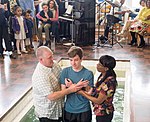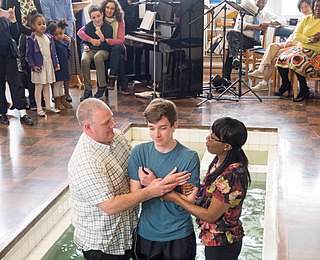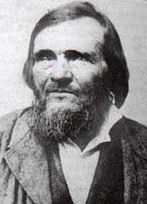| Part of a series on |
| Baptists |
|---|
 |
| |
The Covenanted Baptist Church of Canada is a small body of Predestinarian Baptists in Canada with Scottish roots. [1]
| Part of a series on |
| Baptists |
|---|
 |
| |
The Covenanted Baptist Church of Canada is a small body of Predestinarian Baptists in Canada with Scottish roots. [1]
In 1818 Dugald Campbell, of North Knapdale, Scotland emigrated to Canada and settled in Aldborough, Elgin County, Ontario. [2] Campbell was a deacon in Scotland, but upon his arrival soon began preaching.
In 1820, Elder Dugald Campbell and his followers, believing the Regular Baptists of the area had departed from gospel faith and order, withdrew from them and constituted a church in Aldborough, now known as the Particular Covenanted Baptist Church in Canada. Still a small group, they had grown to five churches in the 1850s - Aldborough, Dunwich, Ekfird, Lobo, and Orford. [3] The Covenanted Baptist Church did not fellowship with any other churches in North America, until an elder, Thomas McColl, received some issues of the Signs of the Times, a Primitive Baptist periodical published by Gilbert Beebe of New York City. In 1857 and 1858, McColl invited Primitive Baptists to visit and preach among their churches. The two groups saw they were established on the same faith and order, and began a relationship of fellowship one with another, which continued to the 20th century. The Covenanted Baptists held the doctrine of absolute predestination, and, after Primitive Baptists in the United States suffered division, remained in correspondence with the Absolute Predestinarian Primitive Baptists.

The Christian Church is a mainline Protestant Christian denomination in the United States and Canada. The denomination started with the Restoration Movement during the Second Great Awakening, first existing during the 19th century as a loose association of churches working towards Christian unity, then slowly forming quasi-denominational structures through missionary societies, regional associations, and an international convention. In 1968, the Disciples of Christ officially adopted a denominational structure at which time a group of churches left to remain nondenominational. It is affiliated with the Disciples Ecumenical Consultative Council and the World Communion of Reformed Churches.

The Second Great Awakening was a Protestant religious revival during the early 19th century in the United States. The Second Great Awakening, which spread religion through revivals and emotional preaching, sparked a number of reform movements. Revivals were a key part of the movement and attracted hundreds of converts to new Protestant denominations. The Methodist Church used circuit riders to reach people in frontier locations. The Second Great Awakening led to a period of antebellum social reform and an emphasis on salvation by institutions. The outpouring of religious fervor and revival began in Kentucky and Tennessee in the 1790s and early 1800s among the Presbyterians, Methodists and Baptists.

The Restoration Movement is a Christian movement that began on the United States frontier during the Second Great Awakening (1790–1840) of the early 19th century. The pioneers of this movement were seeking to reform the church from within and sought "the unification of all Christians in a single body patterned after the church of the New Testament."

Reformed Baptists are Baptists that hold to a Calvinist soteriology (salvation). They can trace their history through the early modern Particular Baptists of England. The first Calvinist Baptist church was formed in the 1630s. The 1689 Baptist Confession of Faith was written along Calvinist Baptist lines. The name “Reformed Baptist” dates from the latter part of the 20th Century to denote Baptists who have adopted elements of Reformed theology, but retained Baptist ecclesiology.

Two-Seed-in-the-Spirit Predestinarian Baptists are part of a larger sub-group of Baptists that is commonly referred to as "anti-mission" Baptists. This sub-group includes the Duck River and Kindred Baptists, Old Regular Baptists, some Regular Baptists and some United Baptists. Only a minuscule minority of Primitive Baptists adhere to the Two-Seed doctrine. The primary centers of Two-Seedism were in Northern Alabama, Arkansas, Eastern Tennessee, Florida, Georgia, Illinois, Indiana, and Texas. As of 2002, five churches or congregations of this faith and order still existed in Alabama, Indiana, Tennessee, and Texas.

The National Primitive Baptist Convention, USA is a group of Black Primitive Baptists that has adopted progressive methods and policies not in keeping with the historical and theological background of Primitive Baptists in general. The Convention was organized in Huntsville, Alabama in 1907. These churches have adopted the use of instrumental music, Sunday Schools, revivals and church auxiliaries. The idea of a national convention is itself foreign to standard Primitive Baptist concepts. They still adhere the Calvinistic or Predestinarian teachings held by other Primitive Baptists, but in a more progressive mannaer and are similar to the black National Baptist Conventions. The NPBC churches continue with Primitive Baptist usage in retaining the observance of feet washing as an ordinance of the church, and in calling their ministers "elder." These churches are not in fellowship with the remaining "old school" white Primitive Baptists. Most of the National Primitive Baptist Convention churches are located in the southern United States.
The Old Regular Baptist denomination is one of the oldest in Appalachia with roots in both the Regular and Separate Baptists of the American Colonies and the Particular Baptist of Great Britain. This group has seen a marked decline in its membership during the last two decades. The Old Regular Baptist Faith and order with her many branches and factions still remains the dominant Faith in some rural Central Appalachian Counties along or near the Kentucky Virginia border.

Regular Baptists are "a moderately Calvinistic Baptist sect that is found chiefly in the southern U.S., represents the original English Baptists before the division into Particular and General Baptists, and observes closed communion and foot washing", according to Merriam Webster. This definition describes Old Regular Baptists, not those who formed as a result of the Fundamentalist-Modernist controversy.

The Baptist General Convention of Texas (BGCT) is the oldest surviving Baptist convention in the state of Texas. It is affiliated with the Southern Baptist Convention and the Baptist World Alliance. In 2009, the BGCT began to also go by the name Texas Baptists to better communicate who they are. The convention's offices are located in Dallas, Texas, though convention staff are located across the state. The president of the BGCT is Jason Burden and the Executive Director is David Hardage.
Greenville Presbyterian Theological Seminary is a confessional Presbyterian seminary in Taylors, South Carolina, United States. Founded in 1986, Greenville Presbyterian Theological Seminary exists to equip preachers, pastors, and churchmen for Christ's Kingdom. The school is modeled on Old Princeton Theological Seminary of the late 19th and early 20th centuries. It teaches the accuracy and doctrinal integrity of the Westminster Confession of Faith, together with the Larger and Shorter Catechisms, as adopted by the Presbyterian Church in America. It is not affiliated with a specific denomination, but graduates of the Seminary minister in denominations such as the Presbyterian Church in America (PCA), Orthodox Presbyterian Church (OPC). Associate Reformed Presbyterian Church (ARP), United Reformed Churches in North America (URCNA), Reformed Church in the United States (RCUS), Reformed Presbyterian Church, Free Church of Scotland, Evangelical Presbyterian Church in England and Wales (EPCEW), Reformed Presbyterian Church of North America (RPCNA), Igreja Presbiteriana do Brasil, Association of Reformed Baptist Churches of America (ARBCA), Reformed Baptist Network (RBN), Communion of Reformed Evangelical Churches (CREC), Bible Presbyterian Church (BPC), Presbyterian Reformed Church (PRC), and in a number of Independent congregations. The current president of the seminary is Jonathan Master, formerly the Dean of the School of Divinity at Cairn University.
The Church of Christ, Instrumental, also known as Kelleyites, are a baptistic body of Christians based in central Arkansas.

The Canadian and American Reformed Churches (CanRC) are a federation of over sixty Protestant Christian churches in Canada and the US, with historical roots in the Reformed Churches of the Netherlands, and doctrinal roots in the sixteenth-century Protestant Reformation. Its emphasis is on Biblical, Christ-centered, covenantal, redemptive-historical preaching and teaching, and holy living as a response of gratitude to the gospel.

The Evangelical Christian Church(Christian Disciples) as an evangelical Protestant Canadian church body in North America (2004) can be traced to the formal organization of the Christian Church in 1804, in Bourbon County, Kentucky under the leadership of Barton Warren Stone (1772–1844). The Stone Movement later merged with the efforts of Thomas Campbell (1772–1854) and his son Alexander Campbell (1788–1866) to become the Restoration Movement that gave birth to the Churches of Christ (Non-Instrumental), the Christian churches and churches of Christ, the Churches of Christ (non-institutional), and the Disciples of Christ. The Evangelical Christian Church as a separate group within the Restoration tradition was reorganized in 2001. The Evangelical Christian Church's national office in Canada is in Waterloo, Ontario.
In Christianity, an elder is a person who is valued for wisdom and holds a position of responsibility and authority in a Christian group. In some Christian traditions an elder is an ordained person who serves a local church or churches and who has been ordained to a ministry of word, sacrament and order, filling the preaching and pastoral offices. In other Christian traditions, an elder may be a lay person serving as an administrator in a local congregation, or be ordained and serving in preaching or pastoral roles. There is a distinction between ordained elders and lay elders. The two concepts may be conflated in everyday conversation. In non-Christian world cultures the term elder refers to age and experience, and the Christian sense of elder is partly related to this.

Daniel Parker was an early American leader in the Primitive Baptist Church in the Southern United States and the founder of numerous churches including Pilgrim Primitive Baptist Church at Elkhart, Texas, the location of the Parker family cemetery. As an elder, Parker led a group who separated from that church and formed the Two-Seed-in-the-Spirit Predestinarian Baptists. Parker is one of the earliest documented proponents of the doctrine of Serpent Seed among Protestant Christianity.
The Disciples of Christ were a group arising during the Second Great Awakening of the early 19th century. The most prominent leaders were Thomas and Alexander Campbell. The group was committed to restoring primitive Christianity. It merged with the Christians in 1832 to form what is now described as the American Restoration Movement.
Elder William M. Smoot William M. Smoot was a resident of Occoquan, Virginia and for many years was a leading Predestinarian Old School Primitive Baptist preacher in Prince William County. He was the preacher of Occoquan and Quantico Baptist churches from 1888 to 1938. A GOD-called preacher of the original faith and order of the Baptists in America, Elder Smoot, whose followers were known locally as "Smootites," engaged in a heated rivalry over doctrine and practice as set forth in the Bible(KJV) with the reverend Thomas D.D. Clark, whose Union Baptist Church was located across the road from the Quantico Baptist Church in the village of Independent Hill.